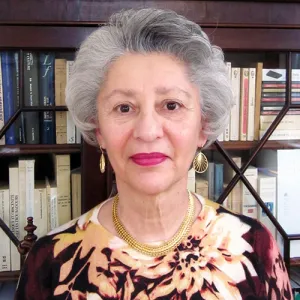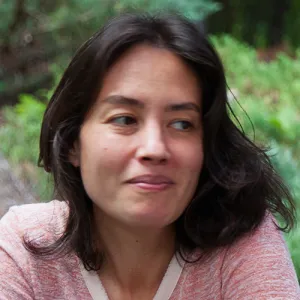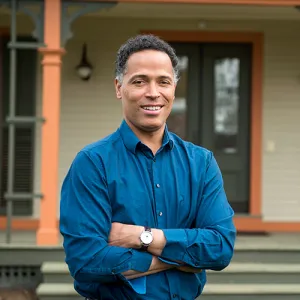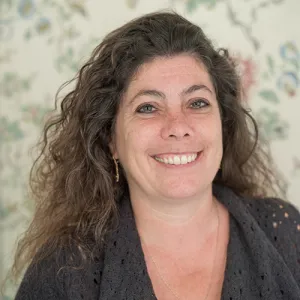French Studies
Explore the art of French, engage with its cultures and rediscover your own through others’ perspectives. The Department of French Studies offers about 30 courses in French language, literature and culture. Students build linguistic skills from beginning through advanced levels in grammar, phonetics and composition and use state-of-the-art technology to assist in their learning. French studies examines issues such as immigration, secularism, identity, gender and education across space (France and Francophone countries) and time, and at the crossroads of literary studies, art, history, linguistics and social sciences. Because the study of foreign languages and cultures lies at the heart of a liberal education, the department carries out its mission across disciplinary and institutional boundaries, and by directing and overseeing Smith’s Study Abroad programs in Paris and Geneva.
Above: This picture was taken on a Smith in Geneva group trip to Lavaux where we attended a wine tasting, had a lunch looking out onto Lac Léman, and took a walk through the vineyards."- Annika Lof ‘25
Announcements
Requirements & Courses
Goals for Majors in French Studies
- As students learn and master the French language, they gain the ability to listen and speak articulately; read and analyze texts, cultural artifacts and digital media critically; and write clearly.
- As they explore French and Francophone cultures, society, history, institutions and thought, they develop historical and comparative depth of perspective.
- As they take courses in other departments and/or programs, they build an interdisciplinary framework to develop a comprehensive and nuanced understanding of the French and Francophone world.
- As they engage with communities beyond Smith through study, internships, volunteer and other work opportunities abroad, they become global citizens who value tolerance, appreciate diversity and thereby become prepared to face the challenges of living in a rapidly changing world.
French Studies Major
Requirements
Ten courses (40 credits) at the 200 level or above
- The basis for the French studies major: a topic of FRN 230
- One language course at the advanced level: FRN 270, a topic of FRN 385 or equivalent taken abroad
- One course in French studies on literature or culture before 1900
- Three additional 4-credit courses in French studies at the 300 level or higher, of which two must be taken in the senior year.
- Four additional electives
- Up to two four-credit courses may be taught in English provided they are related to French studies
- Up to two four-credit courses may be in fields unrelated to French studies provided they are taught in French
Major Requirement Details
- Normally, one course counting toward the major may be taken for an S/U grade. A student may take additional S/U credits toward the major with the major adviser's permission.
- Students considering graduate school in the humanities are encouraged to take WLT 300.
Honors
Please consult the director of honors or the departmental website for specific requirements and application procedures.
French Studies Minor
Requirements
Six courses (24 credits)
- The basis for the French studies minor: FRN 220
- One language course at the advanced level: FRN 270 or equivalent
- Three additional courses, FRN 230 and above
- One 300-level course completed in academic residence at Smith College
Minor Requirement Details
- Only courses taught in French can count toward the minor.
- Only one course counting toward the minor may be taken for an S/U grade.
- An exemption from the basis of the minor, FRN 220, as a result of a placement exam does not affect the number of courses required for the minor.
Courses
FRN 101 Accelerated Beginning French I (5 Credits)
This elementary French course is designed to give students with no previous experience in French the opportunity to acquire the fundamentals of the French language and Francophone culture. It emphasizes communicative proficiency, the development of oral and listening skills, self-expression and cultural insights. Classroom activities incorporate authentic French material and are focused on acquiring competency in listening, speaking, reading and writing. Students must complete both FRN 101 and FRN 103 to fulfill the Latin honors distribution requirement for a foreign language. Enrollment limited to 25.
Fall, Spring, Annually
FRN 103 Accelerated Beginning French II (5 Credits)
This second-semester French course allows students to acquire the basic elements of spoken and written French. They learn how to express themselves on a variety of topics and in everyday life situations as they connect to the Francophone world through authentic cultural material and multimedia activities. Students completing the course normally enter FRN 220. Prerequisite: FRN 101 or equivalent. Enrollment limited to 18. {F}
Spring
FRN 120 Intermediate French (4 Credits)
An intermediate language course designed for students with two or three years of high school French. Its main objective is to develop cultural awareness and the ability to speak and write in French through exposure to a variety of media (literary texts, newspaper articles, ads, clips, films, videos). Students completing the course normally enter FRN 220. Enrollment limited to 18. {F}
Fall
FRN 220 High Intermediate French (4 Credits)
Review of communicative skills through writing and class discussion. Materials include two movies, a comic book and two novels. Prerequisite: three years of high school French, FRN 103, FRN 120 or equivalent. Students completing the course normally enter FRN 230. Enrollment limited to 18. {F}
Fall, Spring
FRN 230bl Colloquium: Topics in French Studies- Banlieue Lit (4 Credits)
In this course, students study fiction, memoir, slam poetry and hip-hop authored by residents of France’s multi-ethnic suburbs and housing projects, also known as the "banlieues" and "cités". The class examines the question of whether "banlieue" authors can escape various pressures: to become native informants; to write realistic rather than fantastical novels; to leave the “ghetto”; to denounce the sometimes difficult traditions, religions, neighborhoods and family members that have challenged but also molded them. Often seen as spaces of regression and decay, the "banlieues" nevertheless produce vibrant cultural expressions that beg the question: Is the "banlieue" a mere suburb of French cultural life or more like one of its centers? Basis for the major. Prerequisite: FRN 220 or equivalent. Restrictions: FRN 230 may not be repeated. Enrollment limited to 18. Course taught in French. WI {F}{L}
Fall, Spring, Variable
FRN 230cc Colloquium: Topics in French Studies- Culture Clash (4 Credits)
To what degree is being French synonymous with membership in a particular socio economic, cultural or ethnic category? Can marginalized populations (immigrants, peasants, workers, youth, etc.) acquire the necessary tools for social inclusion? What determines the meaning of French identity and who is excluded from the realm of Frenchness? By whom and for what reasons? The course explores the tensions that arise in the development and transmission of French cultural attitudes, tastes and values. Class readings include children’s literature, fiction and memoir. Restrictions: FRN 230 may not be repeated. Enrollment limited to 18. Course taught in French. WI {F}{L}
Fall, Spring, Alternate Years
FRN 230cw Colloquium: Topics in French Studies-French Calligraphies: Contemporary Chinese Women's Writing (4 Credits)
France is home to the largest overseas Chinese community in Western Europe. This course looks at how Francophone women writers and artists of Chinese origin critique and celebrate French culture in their work. Focusing on contemporary fiction, film and graphic art, students consider the role of canonical French literature during the Cultural Revolution, portrayals of Sinophone cultures in France and the relationship between language and stereotype. Through the lens of gendered and multigenerational immigration narratives, students also study such topics as translation, food, sexuality and exile. Restrictions: FRN 230 may not be repeated. Enrollment limited to 18. Prerequisite: FRN 220. Course taught in French. WI {F}{L}
Fall, Spring, Variable
FRN 230en Colloquium: Topics in French Studies- Encountering Nature in the Early Modern World: Flora, Fauna, Empire (4 Credits)
This course examines how writers from the 16th-18th centuries experienced their natural settings. These settings varied widely, encompassing both Europe and the Americas during early phases of colonization. The great variety of flora and fauna in these different locales prompted questions about what nature signified and for whom. How did such factors as gender, religion, ethnicity and social class combine with political influences in each century to cause shifting understandings and representations of the natural world? To explore this question, the class analyzes literary texts in multiple genres alongside illustrations, maps, paintings, historical documents and audiovisual materials. Restrictions: FRN 230 may not be repeated. Enrollment limited to 18. Course taught in French. WI {F}{L}
Fall, Spring, Variable
FRN 230ll Colloquium: Topics in French Studies-French Literary Landscapes (4 Credits)
Through texts by authors from Louis XIV to Colette, this class discusses questions about literary uses of landscape: Why do people flee or search for a landscape? What makes people cherish or fear a particular place? What do landscapes tell readers that the narrator or characters cannot or does not tell? Other authors may include Rousseau, Victor Hugo, Chateaubriand, Maupassant, Apollinaire, Robbe-Grillet and James Sacré. Basis for the major. Prerequisite: FRN 220. Restrictions: FRN 230 may not be repeated. Enrollment limited to 18. Course taught in French. WI {F}{L}
Fall, Spring, Variable
FRN 230tl Colloquium: Topics in French Studies-Tahitian Letters: Island Paradise in the French Cultural Imagination (4 Credits)
“I thought I had been transported to the garden of Eden”: the explorer Bougainville’s 1771 description of the abundance and beauty of “Taïti” set the tone for two centuries of exoticism in French literature and art. This course explores legacies of Enlightenment, colonialism, feminism and postcolonialism through the shifting representations of this so-called island paradise. Readings include travel narratives, philosophical texts, poetry and novels by Rousseau, Diderot, Josephine de Montbart, Charles Baudelaire, Pierre Loti and Chantal Spitz. Works are approached in historical context, drawing connections with visual culture, global developments and contemporary debates. Basis for the major. Prerequisite: FRN 220 or equivalent. Restrictions: FRN 230 may not be repeated. Enrollment limited to 18. Course taught in French. (E) WI {F}{L}
Fall, Spring, Variable
FRN 230ww Colloquium: Topics in French Studies-Women Writers of Africa and the Caribbean (4 Credits)
An introduction to works by contemporary women writers from Francophone Africa and the Caribbean. Topics studied include colonialism, exile, motherhood and intersections between class and gender. The study of these works and of the French language is informed by attention to the historical, political and cultural circumstances of writing as a woman in a former French colony. Texts include works by Mariama Bâ, Maryse Condé, Yamina Benguigui and Marie-Célie Agnant. Basis for the major. Prerequisite: FRN 220. Restrictions: FRN 230 may not be repeated. Enrollment limited to 18. Course taught in French. WI {F}{L}
Fall, Spring, Variable
FRN 235 Speaking (Like the) French: Conversing, Discussing, Debating, Arguing (4 Credits)
A total immersion course in French oral expression using authentic cultural materials: French films and series, songs, video clips, internet resources, news reporting, televised versions of round-table discussions, intellectual exchanges, and documentary reporting. Students learn how the French agree and disagree with one another, converse, argue, and attempt to persuade each other. Interactive multimedia exercises, games, role playing, discussions, and debates, presenting formal exposés and improving pronunciation. Course taught in French. Prerequisite: FRN 230, or equivalent. Instructor permission required. {F}
Interterm
FRN 250 Zooming With the French: Cross-Cultural Connections (4 Credits)
Using webcam and video conferencing technology, students have conversations in real time with French students in Paris. The class examines youth culture in France and explores fundamental cultural differences between Americans and the French. Topics include cultural attitudes and beliefs, social values and institutions as well as relevant socioeconomic issues. Materials: textbooks, cultural essays, surveys, articles, films and songs. Prerequisite: FRN 230 or equivalent. Enrollment limited to 15. Course taught in French. {F}{S}
Fall, Spring, Annually
FRN 251fi Topics in French Media, Now and Then-French Islam and French Muslims (4 Credits)
Through a survey of the contemporary flashpoints in the debate surrounding the place of Islam in French society, this course maps out the field of politicians, activists, youth movements, imams, artists, musicians and other cultural actors that have defined the discourse on the issue. With an emphasis on new media, students analyze a wide variety of documents including internet resources, journalistic articles and blogs, music videos, films, legal texts, political pamphlets, slam poetry, rap songs, as well as photo and video art. Course taught in French. {F}{H}
Fall, Spring, Variable
FRN 251po Topics in the French Media, Now and Then-The French Press Online (4 Credits)
A study of contemporary French social, economic, political and cultural issues through daily readings of French magazines and newspapers online such as Le Monde, Le Figaro and Libération. Course taught in French. {F}{S}
Fall, Spring, Variable
FRN 252cl Topics in French Cinema-Cities of Light: Urban Spaces in Francophone Film (4 Credits)
From Paris to Fort-de-France, Montreal to Dakar, this class studies how various filmmakers from the Francophone world present urban spaces as sites of conflict, solidarity, alienation and self-discovery. How do these portraits confirm or challenge the distinction between urban and non-urban? How does the image of the city shift for “insiders” and “outsiders”? Other topics to be discussed include immigration, colonialism and globalization. Works by Sembène Ousmane, Denys Arcand, Mweze Ngangura and Euzhan Palcy. Course taught in French. {A}{F}{L}
Fall, Spring, Variable
FRN 252ps Topics in French Cinema-Paris on Screen (4 Credits)
Paris is often portrayed by filmmakers as the quintessential romantic setting. Starting with the French New Wave, this course examines films that look at France's capital city differently, as a place where various urban, cosmopolitan or diasporic subcultures live side by side, often unbeknownst to one another. Films by directors such as Truffaut, Godard, Varda, Sautet, Rohmer, Denis, Assayas, and Klapisch. Course taught in French. {A}{F}{L}
Fall, Spring, Variable
FRN 253 The Lady, the Knight, the King (4 Credits)
An introduction to the main cultural and literary currents that shaped Medieval France, a period whose values and concept of "literature" were dramatically different from the present. This class focuses on the rise of courtliness and the invention of romantic love, the legend of King Arthur and the transmission of Celtic themes, adultery and madness, magic and the chivalric quest, and the ribald humour of the fabliaux. Readings include The Romance of the Rose by Guillaume de Lorris, Tristan and Yseut, Marie de France’s Lanval, Chrétien de Troyes’ Yvain, troubadour and trouvère lyric and selected fabliaux. Prerequisite: FRN 230. Course taught in French. {F}{L}
Fall, Spring, Alternate Years
FRN 262 After Algeria: Revolution, Republic and Race in Modern France (4 Credits)
From the colonial conquest in the early 19th century through independence in 1962, Algeria has evoked passions on both sides of the Mediterranean Sea, passions frequently resulting in violence that has not entirely subsided. Through a variety of perspectives and readings, this class explores a post-Algerian French society that appears to be permanently marked by its Algerian experience. To what extent has the experience in and of Algeria transformed contemporary French culture? In what ways can one speak of the Algerian experience in revolutionary terms? Prerequisite: FRN 230, or equivalent. Course taught in French. {F}{L}{S}
Fall, Spring, Variable
FRN 270 Language and Social Justice (4 Credits)
A course in advanced composition for students who wish to improve their mastery of some of the more difficult points of French grammar, syntax and usage, as they reflect on local and global movements calling for social justice in France from the 18th century to the present day. Readings and discussions on topics such as humanism, revolution, the "social question," feminism, antiracism and inclusive writing. Prerequisite: one course in French studies beyond FRN 230, or equivalent. {F}{L}
Fall, Spring, Alternate Years
FRN 276 Living Landscapes: Past, Present and Future (4 Credits)
In recent decades, as the effects of climate change have become increasingly apparent, landscapes have come to be understood as those places not only that humans inhabit, but also that inhabit humans. This course examines literary and filmic texts that portray, interrogate and imagine the reciprocal relationship between humans and landscapes in contemporary French-speaking locales. Specifically, students consider how this exchange occurs over time by examining depictions of landscapes past, present and future. Course taught in French. (E) {F}{L}
Spring, Alternate Years
FRN 282md Topics in 19th and 20th Century French Studies-From the Personal to the Political: Stories about Moral Dilemmas (4 Credits)
This course is about dilemmas, i.e. moments in life when one has to choose between two valid but mutually exclusive options. It explores how major writers of the 19th and 20th centuries have used moral conflicts in their works to confront what they saw as the most pressing social, political or personal issues of their times. One novel (excerpts), one autofiction, one theater play and one film script provide the class with four different yet complementary venues for examining and debating the moral implications of dilemmas. Works by Hugo, Gide, Camus and Duras. Prerequisite: one course above FRN 230. Course taught in French. {F}{L}
Fall, Spring, Variable
FRN 286 Invisible Minority: Chinese Culture in France (4 Credits)
A reference to the French phrase minorité visible, this course’s title highlights the recurrent critique from East Asians in France that theirs is a forgotten minority group. To understand this critique, the class traces the history of exoticized representations of Chinese culture in France from the 17th century to the present. The class then turns to recent literary works by Chinese diasporic writers to consider how they represent their native cultures for a French audience amidst China’s shift in status on the global stage. Finally, the class examines images of Asian culture in contemporary French media and popular culture. Course taught in French. {F}{L}
Fall, Spring, Alternate Years
FRN 288 Immigration and Sexuality in France and Europe (1 Credit)
This course functions as a French discussion course offered in conjunction with SWG 288. Students discuss the assigned texts, which they read in the original French. Papers and assignments must also be written in French. Corequisite: SWG 288. Prerequisite: One course at or above FRN 250. French heritage speakers should contact the instructor. Enrollment limited to 35. Course taught in French. {F}{H}{S}
Fall, Spring, Variable
FRN 295 French Translation in Practice (2 Credits)
Practicum in French; must be taken concurrently with WLT 150. Students read short texts in translation theory, study translation techniques and strategies, compare versions of translated texts and produce their own translations of French texts. Readings and discussions conducted in French. Course taught in French. This course does not count as preparation for the Smith Programs Abroad in Paris and Geneva. Corequisite: WLT 150. Prerequisite: two courses above FRN 230, or equivalent. {F}{L}
Spring
FRN 299/ ITL 299/ POR 299/ SPN 299 Teaching Romance Languages: Theories and Techniques on Second Language Acquisition (4 Credits)
Offered as FRN 299, ITL 299, POR 299 and SPN 299. The course explores the issues in world language instruction and research that are essential to the teaching of Romance languages. Special focus is on understanding local, national and international multilingual communities as well as theories, methods, bilingualism and heritage language studies. Discussions include the history of Romance languages, how to teach grammar and vocabulary, the role of instructors and feedback techniques. The critical framing provided helps students look at schools as cultural sites, centers of immigration and globalization. Class observations and scholarly readings help students understand the importance of research in the shaping of the pedagogical practice of world languages. Prerequisite: At least 4 semesters (or placement to equivalent level) of a Romance language taught at Smith (Italian, Portuguese, Spanish or French). Enrollment limited to 25. {F}{S}
Fall, Spring, Annually
FRN 320 Women Defamed, Women Defended (4 Credits)
The voices of medieval women juxtaposed with the voices of men seeking to defame them (the antifeminist tradition.) How did women writers of the Middle Ages engage with the conventions and rhetoric of misogyny? To what extent did they question the traditional gender roles of their society? How did they represent female characters in their works, and what do their statements about authorship reveal about their understanding of themselves as champions of women? Readings include the love letters of Héloïse, the lais and fables of Marie de France, the songs of the trobairitz and women trouvères, and the writings of Christine de Pizan, alongside excerpts from the major antifeminist tracts of the Middle Ages. {F}{L}
Fall, Spring, Variable
FRN 330 Scientific Selves: Medicine, Technology and Identity in Early Modern France (4 Credits)
From the 16th-18th centuries, the Scientific Revolution led to breakthroughs in biology, medicine and technology. This course examines how such breakthroughs informed attitudes toward various aspects of human identity in the French context. How did scientific discourse depict those who did not fit into paradigms of gender, sexuality, ability, ethnicity, belief and culture? What parallels identify with modern-day activism? To explore these questions, students analyze literary texts, visual representations, medical treatises and scientific diagrams. Students also collaborate with the Botanic Garden to study medicinal plants, interrogate modern day health concerns and create our own wellness tea blends. Prerequisites: Two courses above FRN 230 or equivalent. {F}{L}
Fall, Spring, Alternate Years
FRN 365ca Topics in Francophone Literature and Culture-Food, Hunger, Memory: Literature of the Caribbean (4 Credits)
Food and its absence are persistent themes in Caribbean literature. Cooking and culinary practices serve as a means of preserving cultural identities, yet can also reinforce colonial visions of the Caribbean as an exoticized space. Hunger figures as an indictment of that colonial history and of contemporary global inequities. Through studies of folktales, short stories, poetry and novels, this course offers an introduction to the literature and major theoretical movements of Guadeloupe, Martinique and Haiti, with a focus on how cultural memory is inscribed in metaphors of consumption. {F}{L}
Fall, Spring, Variable
FRN 372 Literature and the News: Writing France in the Age of Print Capitalism (4 Credits)
In nineteenth-century France, the emerging periodical press lay at the epicenter of public and cultural life. This course explores the press from a number of perspectives: the technological breakthroughs and social upheavals that spurred its growth, the major figures and seminal publications that marked its evolution, the debates and scandals sparked by its rise, and the changing roles of hommes and femmes de presse. Readings include articles from major newspapers and magazines, contemporary literary and cultural criticism, and selections from "novels of journalism" by Balzac and Maupassant. Class introduce students to research in online databases of digitized newspapers. (E) {F}{H}{L}
Fall, Spring, Variable
FRN 380af Topics in French Cultural Studies-Les Annees Folles (4 Credits)
This class enters "les années folles" in Paris in this advanced culture class, taught in French. During the Roaring Twenties, jazz sizzled, Montmartre shimmied and Joséphine Baker’s Danse sauvage mesmerized crowds at the Music-Hall des Champs Elysées. Song, literature, dance, poetry, painting and the arts aligned to form an (in)coherent, (inter)national cultural proclamation. How might people interpret this riveting period today? The class discusses the roles of women, writers, soldiers, African Americans and others in “modern” French society at the end of the Great War. Restrictions: FRN 380 may be repeated once with a different topic. {F}{H}{L}
Fall, Spring, Variable
FRN 380fa Topics in French Cultural Studies-France in America (4 Credits)
What is l’Amérique française? What is the nature of the French-American relationship, historically and today? During recent Franco-American culture wars, France and the United States seemed to be polar opposites. Yet at one time, people in New England and Louisiana spoke French, lived and laughed in French, cried and died in French. Must French now be translated in America? Through what cultural mechanisms is Frenchness expressed by Americans? In what language(s) does one write French America today? This class answers such questions in the exploration of the French experience of North America from the 16th to the 21st century. Restrictions: FRN 380 may be repeated once with a different topic. {F}
Fall, Spring, Variable
FRN 380is Topics in French Cultural Studies-Immigration and Sexuality (4 Credits)
This course explains how gender and sexuality have been politicized in immigration debates in France, from the 1920s to the present. Students examine both cultural productions and social science texts: memoirs, psychoanalytical literature, activist statements, sociological studies, feature films, fashion, performance art, blogs and news reports. France has historically been the leading European host country for immigrants, a multiplicity of origins reflected in its current demographic make-up. Topics include: the hyper-sexualization of black and brown bodies, France as a Mediterranean culture, immigrant loneliness in Europe, intermarriage and demographic change, the veil and niqab, as well as sexual nationalism and homo-nationalism. Restrictions: FRN 380 may be repeated once with a different topic. {F}
Fall, Spring, Variable
FRN 380tw Topics in French Cultural Studies- Travel Writing and Self-Discovery (4 Credits)
A survey of Francophone travel writing from the 16th to the 21st centuries. Students are exposed to a literary form that achieved popularity and cultural prestige early on, was then significantly challenged and diversified, and is presently enjoying a resurgence. The class considers fictional and nonfictional accounts reflecting different geographies of travel and migration. While early voyagers tended to assert the relative superiority of French culture, subsequent generations of travelers abandoned discovery for self-discovery and critiqued colonialism instead of indigenous cultures. Countries and regions surveyed include the Holy Land, Turkey, Spain, Morocco, Algeria, Central and West Africa, the United States, Iran, France, Indonesia and Thailand. Restrictions: FRN 380 may be repeated once with a different topic. {F}{L}
Fall, Spring, Variable
FRN 385bt Advanced Topics in Language-Global French: The Language of Business and International Trade (4 Credits)
An overview of commercial and financial terminology against the backdrop of contemporary French business culture, using case studies, French television and newspapers, and the internet. Emphasis on essential technical vocabulary, reading and writing business documents, and oral communication in a business setting. Prerequisite: a 300-level French course, a solid foundation in grammar, and excellent command of everyday vocabulary, or equivalent. {F}
Fall, Spring, Variable
FRN 392sc Seminar: Topics in Culture-Stereotypes in French Cinema (4 Credits)
In this seminar, students look at films that make a deliberate and often caricatural use of stereotypes in order to make a statement, whether it is to provoke, examine, question, or simply illustrate some aspects of French culture or national consciousness. The stereotypes students consider include cinematic genres (comedies), as well as themes or topics (tradition versus modernity, ‘Frenchness’, racial and class differences). In doing so, students pay particular attention to the way these stereotypes are staged, what their modes of inquiry are, and what conversations, if any, they promote. Films by Renoir, Tati, Buñuel, Jeunet, Ozon, and Sciamma among others. Weekly or bi-weekly film viewings. Readings in film criticism and relevant fields. In French. Restrictions: Juniors and seniors only. Enrollment limited to 12. Instructor permission required. {A}{F}
Fall, Spring, Variable
FRN 404 Special Studies (4 Credits)
Normally for junior and senior majors and for qualified juniors and seniors from other departments. Instructor permission required.
Fall, Spring
FRN 430D Honors Project (4 Credits)
This yearlong course totals 8 credits, 4 credits for each semester. Department permission required.
Fall, Spring
FRN 431 Honors Project (8 Credits)
Department permission required.
Fall, Spring
Crosslisted Courses
ARH 258 The Arts in Eighteenth-Century France (4 Credits)
A study of painting, sculpture, architecture, urban and landscape design, printmaking and the luxury arts in France, from the last years of Louis XIV's reign to the French Revolution. Recurring themes include artists' training and careers; academies, aesthetics and art theory; art criticism and the viewing public; collecting and display; patronage; and the relationship of art to politics, literature and science. France's pacesetting role in contemporary art is explored by looking beyond its borders to other courts--among them Bourbon Naples, some German-speaking principalities, Great Britain, Russia, Spain and Sweden--and to the French Atlantic world. Counts for ARU. {A}{H}
Fall, Spring, Variable
FRN 299/ ITL 299/ POR 299/ SPN 299 Teaching Romance Languages: Theories and Techniques on Second Language Acquisition (4 Credits)
Offered as FRN 299, ITL 299, POR 299 and SPN 299. The course explores the issues in world language instruction and research that are essential to the teaching of Romance languages. Special focus is on understanding local, national and international multilingual communities as well as theories, methods, bilingualism and heritage language studies. Discussions include the history of Romance languages, how to teach grammar and vocabulary, the role of instructors and feedback techniques. The critical framing provided helps students look at schools as cultural sites, centers of immigration and globalization. Class observations and scholarly readings help students understand the importance of research in the shaping of the pedagogical practice of world languages. Prerequisite: At least 4 semesters (or placement to equivalent level) of a Romance language taught at Smith (Italian, Portuguese, Spanish or French). Enrollment limited to 25. {F}{S}
Fall, Spring, Annually
FYS 131 Paris: City of Light (4 Credits)
Urban, architectural and cultural history of Paris, from its founding some 2,000 years ago through the twentieth century. This course explores the layout of streets and parks; the provisioning of infrastructure (water, sewers, public transportation); building typologies; châteaux and country houses in the capital's environs; the social, economic, political and aesthetic contexts of architectural patronage; and how the built environment carries decipherable symbolic meaning. Paris as a subject in the visual arts––in the Impressionist era in particular––is examined, as is the city's status as a perennial crucible of fashion, avant-gardism and modernism. Restrictions: First-years only; students are limited to one first-year seminar. Enrollment limited to 16. WI {A}{H}
Fall, Spring, Variable
SWG 288 Immigration and Sexuality in France and Europe (4 Credits)
Taught in English. This course analyzes the politics of sexuality in immigration debates in France and Europe, from the 1920s to the present. Students examine both cultural productions and social science texts: memoirs, psychoanalytical literature, activist statements, sociological studies, films, fashion, performance art, music videos, and dance forms. France has historically been the leading European host country for immigrants, a multiplicity of origins reflected in its current demographic make-up. Topics include: the hyper-sexualization of black, brown, and Muslim bodies, France as a Mediterranean culture, immigrant loneliness in Europe, intermarriage and demographic change, the veil and niqab, as well as sexual nationalism and homo-nationalism. May be taken concurrently with FRN 288, which is taught in French, for FRN credit. Enrollment limited to 35. {H}{L}{S}
Fall
TSX 330/ WLT 330 Capstone Seminar in Translation Studies (4 Credits)
Offered as WLT 330 and TSX 330. The capstone seminar brings together a cohort of concentrators to discuss a final translation project that each student undertakes with the guidance of their adviser in the concentration and to situate the project within the framework of larger questions that the work of translation elicits. The readings focus on renowned practitioners’ reflections on the challenges, beauties and discoveries of translating. Students compare how translations transform the original novel and question the concept of original text as it interacts with the culture and the language into which it is translated. Open to students in the Concentration in Translation Studies and World Literatures. Prerequisite: WLT 150. Restrictions: Juniors and seniors only. Enrollment limited to 12. Instructor permission required. {L}
Spring
WLT 271 Writing in Translation: Bilingualism in the Postcolonial Novel (4 Credits)
A study of bilingualism as a legacy of colonialism, as an expression of exile, and as a means of political and artistic transformation in recent texts from Africa and the Americas. We consider how such writers as Ngugi wa Thiong’o (Kenya), Assia Djebar (Algeria), Patrick Chamoiseau (Martinique) and Edwidge Danticat (Haiti/U.S.) assess the personal and political consequences of writing in the language of a former colonial power, and how they attempt to capture the esthetic and cultural tensions of bilingualism in their work. {L}
Fall, Spring, Variable
Additional Programmatic Information
To evaluate how well students are achieving departmental learning goals, the Department of French Studies developed a series of assessment activities undertaken at different stages of a student’s career at Smith as follows:
- Under the guidance of their major adviser, students are asked to self-assess their proficiency in French, using tools created by the Common European Framework of Reference for Languages (CEFR), an internationally recognized set of guidelines used across Europe to describe foreign language proficiency in listening, reading, speaking and writing according to reference levels from A1 to C2.
- Students enrolled in the Smith Program Abroad in Paris are required to take the TCF (Test de Connaissance du Français, the equivalent of the TOEFL for English speakers) in the spring semester prior to their departure and at the end of their junior year abroad. The TCF is an official French language test administered by the French Ministry of Education, which evaluates student proficiency from A1 to C2 according to the CEFR standard. Students enrolled in the Smith Program Abroad in Geneva take a similar test upon their arrival in Geneva and before their departure.
Director
Dawn Fulton
430d Thesis (8 credits)
Full-year course offered each year
431 Thesis (8 credits)
Offered fall semester each year
The honors program is for French studies majors who desire to conduct independent research on a specific aspect of French or Francophone literature or culture during their senior year. Students are eligible to apply for the honors program either at the completion of the second semester of their junior year or before the end of the second week of classes in September of their senior year.
Eligibility
A student who applies to do honors work must have a 3.5 GPA in French studies. Honors students work closely with a faculty adviser to conceptualize and carry out study that culminates in a paper of about 50-80 pages in length or an equivalent project; this work is done either as FRN 430d (a full-year, 8 credit course, with thesis or project due by mid April of the senior year) or FRN 431 (a fall-semester, 8-credit course, with thesis or project due on the first day of the second semester of the senior year).
Presentation
The thesis or project may be presented in either English or French; the choice of language must be approved by the thesis adviser and the director of honors. FRN 430d or FRN 431 may substitute for one of the two 300-level French courses required in the senior year to complete the French studies major.
Evaluation
In the second semester of the senior year, the honors candidate will take an oral examination based on her thesis or project and the field in which it was written. Evaluation of honors work for the degree with "honors," "high honors," or "highest honors" is based on the following:
- 10 percent on the oral examination
- 60 percent on the evaluation of the final thesis project by the thesis adviser and a second reader
- 30 percent on the candidate's grades in the French studies major
Frequently Asked Questions
How should I prepare to do an honors thesis?
Students contemplating honors work should begin talking to professors in their area of interest during their junior year, at the latest. Many honors projects have developed from interests fostered by course work done at Smith or on a Junior Year Abroad.
How do I find an honors thesis adviser?
Most students use course experience or consult the department website to identify professors whose research interests coincide with theirs. The departmental director of honors can also be a resource for matching student interests to faculty expertise. The next step is to contact the relevant faculty member(s) to discuss the possibility of doing an honors project.
How do I apply for honors?
Interested students should consult the departmental honors section of the class deans website for complete information on applying for honors and for information on funding resources.
Can I do honors if I go abroad junior year?
Yes. In fact, many honors projects ideas begin on a Junior Year Abroad program. You should be prepared to approach your potential Smith adviser while you are still abroad.
What are the benefits of doing a thesis or honors project?
The honors project provides you the unique opportunity of immersing yourself in a research project to greater depth than anything else you will experience in your undergraduate studies. Your research and writing skills will develop immensely during the process. Many students derive great satisfaction from bringing an idea to full development and expression in an honors project.
What are the disadvantages to doing an honors thesis?
A thesis requires an enormous commitment of time and intellectual energy. The 8-credit thesis may mean that you take fewer courses during your senior year, which may limit your options for studying a wide variety of subjects. Some students report being intimidated by the writing commitment. However, if you think of the thesis as a related group of 3-4 papers, each 15-20 pages in length, accompanied by an introduction and conclusion, the task becomes feasible.
Special studies provide a way for students to explore a particular topic or issue not taught in any course offered by the Department of French Studies and in the Five Colleges during the academic year of the proposed special studies.
Students work with a faculty adviser to create a syllabus comprising the description of the proposed special studies, a list of readings, work expectations, assignments and a timeline. The faculty adviser then brings the proposed course description and syllabus to the department for a formal vote.
The faculty adviser and the student normally meet weekly for an hour. Students are expected to write, at a minimum, a 20-page paper, or the equivalent. All work is conducted in French. Special studies carry 4 credits. The final grade is based on a separate grade to evaluate participation and preparation in addition to the grade given to the final paper.
Prerequisites: at least two 300-level courses in French studies; previous coursework on a relevant topic is strongly recommended.
In accordance with college policy, an exceptional special studies can be converted into an honors thesis. See the class deans website for information about departmental honors.
Normally, FRN 404 cannot be repeated for credit.
FRN 404 Special Studies
Admission by permission of the department; normally for junior and senior majors and for qualified juniors and seniors from other departments. Credits: 4
Members of the department
Normally offered each academic year
Please check the course catalog for up-to-date information. You can also see the Five College course schedule.
All classes and exams are conducted in French with the exception of cross-listed courses, unless otherwise indicated.
Language Courses
-
FRN 101 01 Accelerated Beginning French I
-
FRN 103 01 Accelerated Beginning French II
-
FRN 103 02 Accelerated Beginning French II
-
FRN 220 01 High Intermediate French
-
FRN 220 02 High Intermediate French
Intermediate Courses in French Studies
- FRN 230 Colloquium in French Studies
- FRN 230cc 01 Culture Clash
- FRN 230en 01 Encountering Nature in the Early Modern World: Flora, Fauna, Empire
- FRN 230tl 01 Tahitian Letters: Island Paradise in the French Cultural Imagination
- FRN 250 01 Zooming with the French: Cross-Cultural Connections
- FRN 251fi 01 Topics in French Media, Now and Then - French Islam and French Muslims
- FRN 286 01 Invisible Minority: Chinese Culture in France
-
FRN 295 01 French Translation in Practice
Advanced Courses in French Studies
Prerequisite: two courses in French studies above 230 or permission of the instructor. Course numbers reflect chronological periods and not the level of difficulty.
- FRN 320 01 Women Defamed, Women Defended
- FRN 330 01 Scientific Selves: Medicine, Technology and Identity in Early Modern France
Cross-listed and Recommended Courses from Other Departments
- TSX 330 01 Capstone Seminar in Translation Studies
- WLT 330 01 Capstone Seminar in Translation Studies
Complete online exam by Tuesday, August 20, 2024
The Department of French Studies offers an online placement examination to test students' proficiency in understanding spoken French as well as in reading and writing. The online placement examination is accessible on Moodle.
Students who have taken at least one year of French should take this exam. Students who have taken the ETS Achievement and/or Advanced Placement tests will find among the materials provided to their advisers recommended placement in language or literature courses based on their scores.
*Even if you have taken these tests, we encourage all students to take our placement test, as it will help the department to advise students about course selection. Click on the link below for detailed instructions.
Faculty
Emeriti
Why Study French?
Alum Spotlight
Those majoring in and studying French can pursue many different careers. Graduates have gone on to teach at all levels; work in the foreign service, Peace Corps or in the arts; study law, business and medicine; and pursue advanced degrees in French literature, music, translation and theater.
Every year a number of French majors also successfully apply for one of the 1,500 openings for French teaching assistantships to teach English in a French lycée. Consult the Teaching Assistant Program in France site for the latest information on how to apply.
“After my JYA in Paris, I knew the city of lights was the place I wanted to live. I was hired at ESMOD, the oldest fashion school in the world. I translate marketing materials, prepare for open houses and field applications for courses. Thanks to my French major, I work in a beautiful building in the heart of Paris where I learn more about the French language and culture each day.”
“I couldn’t have been happier with my experience at Smith. Many of the language skills, literary references and cross-cultural understandings that I used while living abroad, post-graduation, and in my present career as a librarian in the Alliance Française network stem directly from my years as a French major.”
“Studying French at Smith—especially on the JYA Paris program—ignited my passion for travel and set me on a path to completing a master’s in creative writing and translation. I now write for such magazines as Travel + Leisure, Architectural Digest, DuJour, the Wall Street Journal and many others.”
Contact Department of French Studies
Seelye Hall 307
Smith College
Northampton, MA 01063
Phone: 413-585-3056
Administrative Assistant:
Erin Hayes
Individual appointments may be arranged directly with the faculty.















